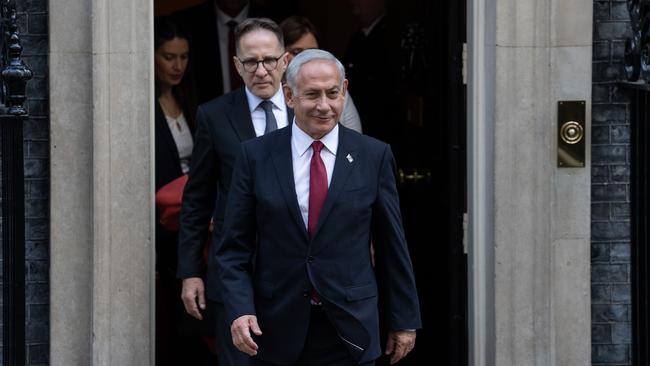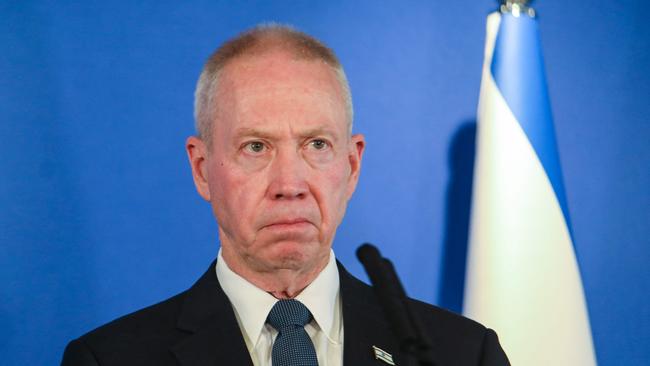Israel’s Netanyahu fires defence minister as pressure against judicial overhaul mounts
Proposed sweeping changes to the country’s judicial system has seen tens of thousands protest - with the underfire PM now at risk of losing the coalition who helped elect him.

Israeli President Issac Herzog on Monday called for an immediate halt to Benjamin Netanayahu’s judicial reform, a day after the Prime Minister sacked his defence minister for similar demands.
Mr Netanyahu sacked Yoav Gallant on Sunday as he tried to rein in growing dissent within his party over a judicial overhaul that has divided the country.
Mr Herzog, who holds a largely ceremonial role, made the call on Twitter following large demonstrations in Tel Aviv overnight. “For the sake of the unity of the people of Israel, for the sake of responsibility, I call on you to stop the legislative process immediately,” he tweeted.
The decision to fire Mr Gallant came one day after the minister, who is a member of Mr Netanyahu’s Likud party, said the judicial overhaul should be delayed because protests over the proposals within the military had become a grave threat to the country.
Mr Gallant’s sacking comes as Mr Netanyahu barrels forward with a deeply divisive judicial overhaul plan that has sparked some members of his own party to urge him to delay bringing the legislation to a vote. Still, if he delays the vote he risks the collapse of his coalition as most of his allies are adamant on pushing ahead with the legislation.
The decision to rein in any dissent suggests Mr Netanyahu won’t back down from the overhaul, even as many political analysts believe the country could be headed towards a constitutional crisis.
“We’re in an unprecedented crisis and we don’t know how it will end,” said Nimrod Novik, a fellow at the New York-based Israel Policy Forum think tank. “ (Mr Netanyahu) is throwing fuel on this protest movement and we’re on our way to the logical conclusion: a constitutional crisis.”
The legislation to overhaul the country’s judicial system has rocked this country of nine million people, with up to half a million Israelis coming out weekly to protest against the plan for 12 straight weeks. In response to Mr Gallant’s sacking, late on Sunday tens of thousands of Israelis took to the streets of Jerusalem, Tel Aviv and other cities to protest.

The Israeli parliament, or Knesset, is set to vote as early as this week on legislation that would give the government an automatic majority on the panel that chooses judges, although some appointments would still require compromise. If it passes, it would lay down the first major pillar of a much larger judicial overhaul that has prompted some of the largest protests in Israel’s history. Both supporters and opponents of the overhaul say they are defending the soul of Israel’s democracy.
Opposition Leader Yair Lapid said the move to fire Mr Gallant showed that Mr Netanyahu “is a danger to the security of Israel”.
On Saturday night, Mr Gallant called for delaying the legislation, saying it had sparked division within the military that was turning into a national security threat. He said the rift was causing a “clear, immediate and tangible threat to the security of the country”.
Scores of Israeli reservists, from elite pilots to intelligence officers, have said they would refuse to serve should the judicial overhaul pass, breaking a deep taboo in a country that reveres military service as a sacred national duty.
Israeli security officials have warned the crisis could seriously damage Israel’s military, which relies heavily on the capabilities of its reservists, as tensions rise with regional foes like Iran and with Palestinian militants in the West Bank and Gaza.
Mr Netanyahu didn’t say why he sacked Mr Gallant but in a tweet published after the dismissal, he implied Mr Galant had given in to the protesting reservists. “We must all show up mightily against the refusal to serve,” he said.
“The security of Israel was and always will be my life’s mission,” Mr Gallant, a retired major general, tweeted after his dismissal.
Supporters of the overhaul say the country shouldn’t cave to reservists who are holding it hostage and undermining the democratic process. “The people want the judicial reform now! Those who give in to the objectors cannot remain in their jobs for another second,” said far-right minister Itamar Ben-Gvir after Mr Galant was fired.

Following Mr Gallant’s speech on Saturday, three other Likud MPs said they agreed with his call to delay a vote. Mr Netanyahu has 64 seats in the 120-seat Knesset. In response to Mr Gallant’s speech, the overhaul’s supporters within the Likud suggested delaying the vote would mean a collapse of Mr Netanyahu’s government.

Abraham Diskin, a professor emeritus at Jerusalem’s Hebrew University, said Mr Netanyahu needed to balance avoiding a rebellion from his far-right allies if he delays the overhaul, which could topple his coalition, or face the possibility of a divided Israeli military unprepared for any major battles ahead. “It’s either to commit suicide politically … or, on the other hand, endanger Israeli security,” Professor Diskin said.
The Wall Street Journal







To join the conversation, please log in. Don't have an account? Register
Join the conversation, you are commenting as Logout